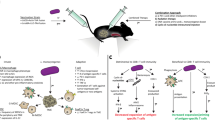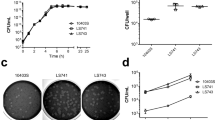Abstract
Background
Listeria monocytogenes is a food-borne, facultative intracellular bacterium that causes severe diseases such as sepsis and meningoencephalitis in immunocompromised hosts. Because it stimulates robust T-lymphocyte-mediated responses, attenuated L. monocytogenes are candidate vaccine vectors for tumor immunotherapy.
Case
We report a case of bacteremia caused by vaccine strain L. monocytogenes (Axalimogene filolisbac) occurring 31 months after immunization against human papilloma virus (HPV) associated cervical cancer.
Conclusion
Receipt of a L. monocytogenes-based vaccine is a novel risk factor for delayed L. monocytogenes bacteremia.
Similar content being viewed by others
References
Lorber B. Listeria monocytogenes. In: Bennett JE, Dolin R, Blaser MJ, editors. Mandell, Douglas, and Bennett’s principles and practice of infectious diseases. Philadelphia: Elsevier Saunders; 2015. pp. 2383–90.
Silk BJ, Mahon BE, Griffin PM, Gould LH, Tauxe RV, Crim SM, et al. Listeria illness, deaths, and outbreaks—United States, 2009–2011. MMWR. 2013;62:228–452.
Charlier C, Perrodeau É, Leclercq A, Cazenave B, Pilmis B, Henry B, et al. Clinical features and prognostic factors of listeriosis: the MONALISA national prospective cohort study. Lancet Infect Dis. 2017;17:510–9. https://doi.org/10.1016/S1473-3099(16)30521-7.
Wood LM, Paterson Y. Attenuated Listeria monocytogenes: a powerful and versatile vector for the future of tumor immunotherapy. Front Cell Infect Microbiol. 2014;4:1–22. https://doi.org/10.3389/fcimb.2014.00051.
Maciag PC, Radulovic S, Rothman J. The first clinical use of a live-attenuated Listeria monocytogenes vaccine: a Phase I safety study of Lm-LLO-E7 in patients with advanced carcinoma of the cervix. Vaccine. 2009;27:3975–83. https://doi.org/10.1016/j.vaccine.2009.04.041.
Miles BA, Monk BJ, Safran HP. Mechanistic insights into ADXS11-001 Human papillomavirus-associated cancer immunotherapy. Gynecol Oncol Res Pract. 2017;4:9. https://doi.org/10.1186/s40661-017-0046-9.
McLauchlin J, Audurier A, Taylor AG. Treatment failure and recurrent human listeriosis. J Antimicrob Chemother. 1991;27:851–7.
Levett PN, Bennett P, O’Donaghue K, Bowker K, Reeves D, MacGowan A. Relapsed infection due to Listeria monocytogenes confirmed by random amplified polymorphic DNA (RAPD) analysis. J Infect. 1993;27:205–7.
Sauders BD, Wiedmann M, Desjardins M, Fenlon C, Davenport N, Hibbs JR, et al. Recurrent Listeria monocytogenes infection: relapse or reinfection with a unique strain confirmed by molecular subtyping. Clin Infect Dis. 2001;33:257–9. https://doi.org/10.1086/321821.
Ciceri G, Gori M, Bianchi S, Corrado G, Panisi P, Papa A, et al. Molecular evidence of Listeria monocytogenes infection relapse in a severe case of endocarditis. JMM Case Rep. 2017;4:e005115. https://doi.org/10.1099/jmmcr.0.005115.
Radoshevich L, Cossart P. Listeria monocytogenes: towards a complete picture of its physiology and pathogenesis. Nat Rev Microbiol. 2017;16:32. https://doi.org/10.1038/nrmicro.2017.126.
Advaxis. ADXS11-001 Investigator Brochure V.15. Lm-LLO Immunotherapy for the treatment of HPV-associated cancers. 2018.
Denham JD, Lee DH, Castro M, Pandya S, Aslam S, Nanjappa S, et al. Two cases of disseminated infection following live organism anti-cancer vaccine administration in cancer patients. Int J Infect Dis. 2018;72:1–2. https://doi.org/10.1016/j.ijid.2018.04.004.
Drevets DA. Listeria monocytogenes virulence factors that stimulate endothelial cells. Infect Immun. 1998;66:232–8.
Charlier C, Leclercq A, Cazenave B, Desplaces N, Travier L, Cantinelli T, et al. Listeria monocytogenes–associated joint and bone infections: a study of 43 consecutive cases. Clin Infect Dis. 2012;54:240–8. https://doi.org/10.1093/cid/cir803.
Lemon KP, Freitag NE, Kolter R. The virulence regulator PrfA promotes biofilm formation by Listeria monocytogenes. J Bacteriol. 2010;192:3969–76. https://doi.org/10.1128/jb.00179-10.
Einhorn TA, Gerstenfeld LC. Fracture healing: mechanisms and interventions. Nat Rev Rheumatol. 2015;11:45–54. https://doi.org/10.1038/nrrheum.2014.164.
Pardoll DM. The blockade of immune checkpoints in cancer immunotherapy. Nat Rev Cancer. 2012;12:252–64.
Stein MN, Fong L, Tutrone RF, Mega AE, Lobo M, Hong Q, et al. KEYNOTE-046: ADXS-PSA plus pembrolizumab (pembro) in metastatic castration-resistant prostate cancer (mCRPC). J Clin Oncol. 2018;36(suppl):abstr 5019.
Becattini S, Littmann ER, Carter RA, Kim SG, Morjaria SM, Ling L, et al. Commensal microbes provide first line defense against Listeria monocytogenes infection. J Exp Med. 2017. https://doi.org/10.1084/jem.20170495.
Acknowledgements
The authors thank Jennifer C. Hunter and Brendan R. Jackson of the Centers for Disease Control and Prevention, Atlanta, GA for assistance with manuscript preparation. We also thank members of the CDC Enteric Diseases Laboratory Branch for pulsed-field electrophoresis analysis, whole-genome sequencing, and whole-genome sequencing analysis: Cheryl L. Tarr, Katie Roache, Zuzana Kucerova, Steven Stroika, and Lee S. Katz.
Author information
Authors and Affiliations
Corresponding author
Ethics declarations
Conflict of interest
This research did not receive any specific grant from funding agencies in the public, commercial, or not-for-profit sectors. EF, CM, LS, and DD are not affiliated with, nor received any funding from Advaxis, Inc. AG and MP are current employees of Advaxis, Inc.
Ethics statement
The clinical trial under which the patient received experimental immunotherapy and subsequent review of her records were done with the approval of the Institutional Review Board at OUHSC.
Rights and permissions
About this article
Cite this article
Fares, E., McCloskey, C.B., Gutierrez, A. et al. Vaccine strain Listeria monocytogenes bacteremia occurring 31 months after immunization. Infection 47, 489–492 (2019). https://doi.org/10.1007/s15010-018-1249-7
Received:
Accepted:
Published:
Issue Date:
DOI: https://doi.org/10.1007/s15010-018-1249-7




